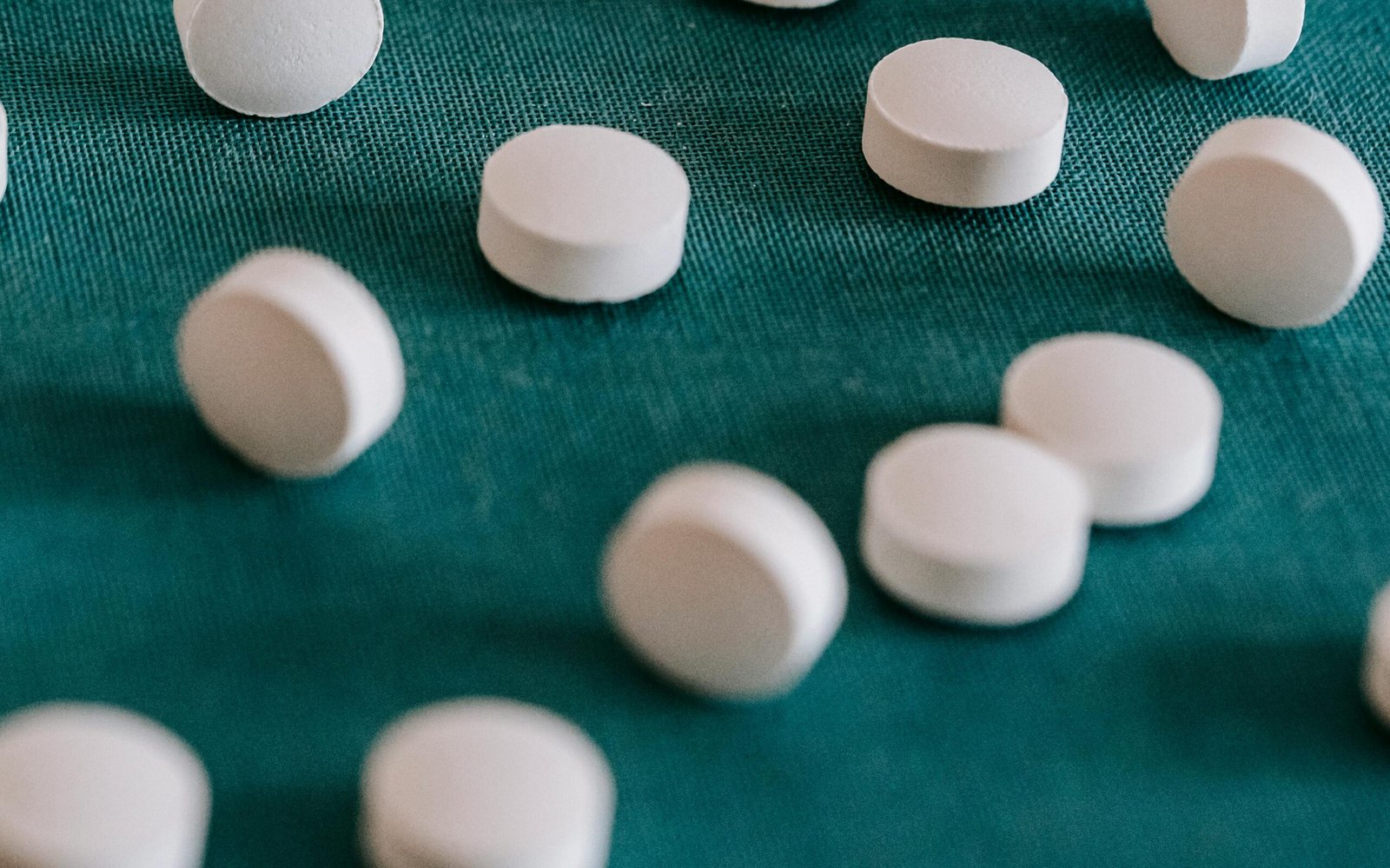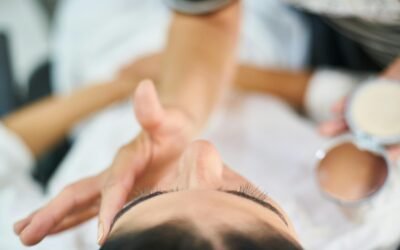Have you been looking into what supplements to take for acne and seen people say that biotin (vitamin B7) made acne worse, or that they broke out after taking B12 supplements? Maybe you’ve tried a multivitamin or a hair, skin and nails supplement that contained both of these and then noticed your skin breaking out. One of the most common anecdotal complaints I see online is that B12 or biotin has caused acne. I’ve even seen people recommend avoiding eggs to reduce the intake of biotin for skin health.
But do these nutrients really cause breakouts? Or is the story a bit more complex?
Well, because of the discussion online I wanted to see if there was evidence to suggest how or why B12 or biotin could make acne worse (which I’ll share with you now). I’ll also share useful context from my clinical experience and understanding of the research, so you can make an informed decision, whether you’re supplementing already or wondering what’s right for your skin.
Can B Vitamins Help Acne?
Before we get into whether B12 or biotin cause acne, let’s start with the positives. B vitamins are one of my most recommended supplements in clinic, even for people with acne. Here’s why:
Vitamins B1, B2, B3 (Thiamine, Riboflavin, Niacin)
- Needed for energy production
- Help the body process carbohydrates, fats and proteins
- Support the nervous system and mitochondrial function
- Niacinamide (a form of B3) is also used topically for acne due to its anti-inflammatory benefits
Symptoms of deficiencies may include:
- Fatigue
- Cracked corners of the lips
- Inflammation of the tongue (glossitis)
- Skin problems like dermatitis
Note: High doses of certain forms of niacin can trigger flushing, which may feel like it’s worsening skin conditions like rosacea. In clinic, I prioritise non-flush forms of niacin to reduce the risk of this happening.
Vitamin B5 (Pantothenic Acid)
- Supports stress resilience and adrenal health
- Has been shown to help regulate cholesterol levels
- Helps the skin form a strong barrier and supports healthy skin cell development
Possible symptoms of a deficiency include:
- Headaches
- Fatigue
Vitamin B6 (Pyridoxine)
- Supports hormonal balance, especially in the luteal phase
- Plays a key role in neurotransmitter production and mood regulation
- Can help reduce PMS-related breakouts
- May reduce symptoms of seborrheic dermatitis
Symptoms of a deficiency:
- Scaly patches
- Red skin and dandruff
- Cracks in the corners of the mouth
- Fatigue
Biotin (B7)
- Supports blood glucose balance
- Helps with fatty acid metabolism
- Supports hair, skin and nail health
Symptoms of a deficiency (rare) can include:
- Hair loss
- Skin issues
- Mood changes
- Fatigue
There’s also a link between gut health and biotin levels. Certain gut bacteria like Bacteroides fragilis, Fusobacterium varium, and Campylobacter coli can produce biotin. If your microbiome is unhealthy, you may have fewer of these bacteria. Other beneficial bacteria like Bifidobacteria, Ruminococcus, and Lactobacillus can’t make biotin, so they rely on your intake to function properly. Low biotin can also affect the growth of these beneficial bacteria.
Vitamin B9 (Folate)
- Essential for red blood cell formation
- DNA synthesis
- Supports healthy cell growth and function
Symptoms of a deficiency:
- Fatigue
- Weakness
- Shortness of breath
- Dizziness
- Pale skin
- Headaches
Vitamin B12
- Supports red blood cell formation
- Supports nerve function
- Helps with energy production
- Supports brain function
Symptoms of a deficiency:
- Numbness or tingling in hands and feet
- Fatigue
- Weakness
- Low tolerance to cold
- Pale skin
- Mouth ulcers
- Memory and cognitive issues
As you can see, there’s a lot of overlap between symptoms of different B vitamin deficiencies. That’s why:
- I like to test which vitamin you’re actually deficient in (especially between folate or B12). You might take B12 for energy, but actually be low in folate.
- I typically use a B complex to support multiple areas of health, unless there’s a clear need for high doses of one nutrient.
Why Would You Be Low in B Vitamins?
Most B vitamins are water-soluble, meaning they need to be replenished daily. If you take too much, the body usually excretes it in urine. Common reasons for deficiency include:
- Low intake – particularly diets low in whole grains, legumes, leafy greens or animal products
- Gut health issues – like low stomach acid, SIBO, coeliac disease, IBD, or other factors affecting absorption
- Medications – such as the contraceptive pill, metformin or antacids, which can deplete B vitamins
- Chronic stress – increases demand for certain b vitamins, including B5 and B6
- Vegan or vegetarian diets – higher risk of B12 deficiency, which can be corrected through supplementation
- Genetic reasons – some mutations on certain genes can increase a person’s need for B vitamins
This is why I always recommend testing before supplementing. In clinic, we use blood and/or gut tests to check for deficiencies and tailor support accordingly. When I recommend B vitamins, it’s usually to correct a deficiency we’ve confirmed through testing – if your vitamins aren’t low and you don’t have symptoms of a deficiency, I wouldn’t use a vitamin B supplement.
Do B Vitamin Supplements Cause Acne?
To say something causes a reaction in science, we need strong evidence across multiple well-designed studies. One small study or a few anecdotes isn’t enough to confirm a cause. Just mentioning this as we talk through whether b vitamins cause acne, or make acne worse. Let’s discuss the two main vitamins mentioned – Biotin and B12.
Can Biotin Cause Acne?
Despite many online claims, there’s no strong scientific evidence showing that biotin causes acne. That’s not me denying it definitely doesn’t cause an issue in some people, but right now we don’t have evidence to support a mechanism in which it would happen.
But here are a few theories:
- Biotin May Increase Keratin Production. Biotin supports keratin production (important for skin, hair and nails). So, a theory is that increasing biotin through supplements may increase keratin production, that could potentially lead to blocked pores. But this hasn’t been proven in clinical research, and there are no studies or case study reports linking biotin supplements to acne, (at this moment in time).
- Biotin Competes With Vitamin B5. Another theory is that high supplementation of Biotin may interfere with levels of B5. This is due to biotin sharing its transporter with vitamin B5, so theoretically taking high doses of one could impair uptake of the other. And since B5 helps to support the skin barrier and production of healthy skin cells, an imbalance could potentially impact skin health. There is no suggestion of how much biotin could displace B5. So when we’re saying ‘biotin causes acne because it affects B5 levels’, how much biotin do you need to be consuming for it to affect B5? We don’t know.
Could Biotin Supplements Help Clear Acne?
On the other hand, one study has suggested that biotin might be helpful in cases of comedonal acne (the type of acne with whiteheads and blackheads) when it is associated with excessive oil production (seborrhea). Biotin supplementation may also help to reduce flaking and irritation caused by topical retinoids. Another (very small study) found that combining biotin with a probiotic supplement, alongside a targeted topical gel appeared to safely reduce acne and improve skin health over 2 months in people with mild to moderate acne.
So what’s my opinion? We don’t have clear research confirming that biotin really worsens or improves acne. But the research actually suggests more positives than negatives at the moment. Some things I would be questioning include:
- Are you taking very high doses of biotin (e.g. 5000 mcg+) without a clear reason?
- Are you taking isolated B vitamins rather than a full B complex?
- Is the supplement low quality or packed with unnecessary fillers?
- Do you have other underlying issues or skin barrier dysfunction that’s contributing to your acne?
- Is there anything else in the supplement that could be affecting your skin, like probiotics, herbs, or other vitamins and minerals?
- Are you on any medications that could possibly interact with the supplement?
- Do you have any underlying health conditions?
So, should you avoid biotin if you have acne?
There are so many reasons why a supplement might not work for you, and this is where understanding your body and underlying drivers helps to find what works for you. If you do think a supplement has made your skin worse, stop taking it for 4 weeks and see what happens. If the breakouts reduce, it may be something in the supplement. If they continue, it might not be the biotin. The only time you’d know for sure if the biotin is an issue is if you had no acne to start with, you then took a biotin-only supplement (and changed nothing else, like skincare, stress etc), experienced acne, then when you stopped it cleared.
Let’s move on to B12…
Can B12 Supplements or B12 Injections Cause Acne?
Of all the B vitamins, B12 has the most research linking it to acne, but we’re still talking about a very small number of case reports.
One study included 10 participants who were all given intramuscular injections of B12, specifically 1 mg of hydroxocobalamin. After a week, one of the 10 participants developed acne. So what caused that one person to develop acne after the B12 injection? Researchers found that elevated B12 levels may influence certain strains of Cutibacterium acnes (formerly P. acnes) to produce more porphyrins, inflammatory compounds that may contribute to acne formation.
The different strains of C. acnes are important here. People who have more acne-related types of C. acnes bacteria on their skin may be more likely to develop acne after B12 injections than those who have fewer of these bacteria.
This links back to the overall health of the skin microbiome, and the amount of different types of bacteria on the skin affects how the whole skin community behaves, which plays a big role in whether the skin stays healthy or develops problems like acne. Which could make you question, is B12 the issue, or is it an imbalance in the skin microbiome that’s reacting to high-dose B12?
But let’s keep this in context:
- It’s a small study of only 10 people
- Only one person in the study developed acne after the injection
- Participants were not tested for baseline vitamin B12 levels before supplementation. Do we know if any of them actually had a deficiency?
- The participant may have a unique skin microbiome profile
Antedotal case studies of B12 supplementation and acne development
There are a few cases of individuals developing acneiform eruptions after B12 supplementation. Acneiform eruptions are different to acne vulgaris. These are acne-like rashes, but they aren’t technically the same as acne vulgaris due to the mechanism of development being different. The key differences are:
- They often appear suddenly
- Usually don’t have blackheads or closed comedones
- Can have papules, pustules, and sometimes nodules or cysts,
- Often caused by external triggers, such as the introduction of medications (like B12 injections or steroids).
Acneiform eruptions can happen in people who’ve never had acne before. They often clear once the trigger is removed, though sometimes they need treatment. Here are some case studies:
Case Study 1: A 67-year-old woman was diagnosed with pernicious anaemia and started on vitamin B12 and folate therapy. Two days after the first intramuscular B12 injection, the patient developed an acneiform eruption on her glabella, nose, cheeks, and perioral area. Her symptoms were managed with clindamycin gel and ketoconazole cream, which resolved the issue. However, it did flare again after repeating the injections.
Case Study 2: A 47-year-old man who had recently been diagnosed with pernicious anaemia, treated with weekly intramuscular hydroxocobalamin injections also experienced acneiforms after the injections. Once B12 levels were normalised, the injections were stopped and lymecycline was started, allowing a complete resolution of the lesions within 3 months.
I also want to note the dosages used here – the supplementation is around 1–10 mg of B12 when reactions have been reported in these case studies. The most common dose of B12 I use in clinic is 0.2-0.4mg via oral supplements, a much smaller dose. It’s also thought that some other ingredients that are in the B12 injections could possibly cause the reaction, instead the the B12 itself – but this will vary on different brands and formulations. Researchers have also questioned whether the form of B12 may make a difference. The four typical forms of B12 in supplements are: cyanocobalamin, methylcobalamin, adenosylcobalamin, and hydroxocobalamin.
Could It Be an Allergy to Cobalt?
Vitamin B12 (also known as cobalamin) contains a small amount of cobalt. In very rare cases, people who are sensitive or allergic to cobalt may experience skin reactions, especially after high-dose B12 injections. This kind of allergy affects approximately 1–4% of the general population and tends to be more common in people with eczema. It’s not something most people need to worry about due to how rare it is, but if unusual rashes occur after starting B12, speak with your doctor, and a skin patch test to check for allergies to metals may help to identify an issue.
Does This Mean B12 Causes Acne?
Not exactly. These studies and cases suggest that B12 may influence acne or acneiforms in susceptible individuals. In some cases, it may be through changes to the skin microbiome, but it’s not a guaranteed trigger.
Acne After B12 Injections – What you need to know
If you do suffer with acne, or have acne prone skin and have a B12 deficiency, you might feel uneasy about having a B12 injection. But let’s talk about why they are important if you do have a diagnosed deficiency. Injectable B12 is typically given when someone has a confirmed deficiency, which may be due to:
- Pernicious anaemia
- Low stomach acid or long-term use of acid-blocking medications
- Gastrointestinal disorders like IBD or coeliac disease
But I need you to know, a B12 deficiency is a serious issue. It can lead to nerve damage, fatigue, mood disorders, memory problems, and even irreversible neurological changes if left untreated. So if it’s been identified via a blood test (through a health professional) and your doctor recommends injections, it is important to get those B12 levels up.
If you’re receiving B12 injections and notice a skin reaction, don’t stop treatment without speaking to your doctor. Instead:
- Talk to your GP or specialist about your symptoms
- Ask for support to manage skin side effects if they occur
- Take a holistic approach to skin health – think about your gut health, blood glucose, nutrient levels and skin microbiome alongside treatment
As discussed in the case studies, if B12 injections caused a flare, it seemed to either settle on it’s own after a few weeks, or topical treatments were used to support the skin afterwards.
How do I know if B vitamins are making my skin worse?
The easiest thing to do in this situation is to stop taking the supplement and see if your skin improves. Similar to the recommendation with a B12 injection, once you stop a B12 or biotin supplement, your levels should reduce again and symptoms should stop if you are reacting to it. However, if it’s a skin complex that you’ve been taking, that contains other herbs, vitamins, minerals, probiotics and other fillers or additives in, we don’t really know if it’s the B12, biotin or something else.
My Clinical Perspective:
In all honestly, I’ve not seen acne as a direct result of biotin or B12 supplements that I’ve used in clinic. I do admit this could just be the types of clients I see in clinic, and maybe none of the clients I’ve worked with react to B12 or biotin supplements (remember that study listed 1 person reacting, out of 10 people).
It’s important to note as well that I’m only recommending supplements at a lower dosage, and based on blood test markers. I’m not giving everyone a B complex or high-dose biotin or B12 supplements without a reason. We also do a lot of gut microbiome support in clinic, and work on multiple underlying drivers of acne, so that might be one of the reasons too, I couldn’t say for sure. As mentioned throughout this blog, we don’t really understand how it’s triggered.
I have worked with clients whose skin improved after switching from general skin and hair supplements, to more targeted ones that we’ve identified as being necessary through testing, or after stopping excess supplementation. In some cases, addressing gut issues (like bacterial or fungal imbalances, digestive issues or inflammation) makes a bigger difference than changing their supplements or removing foods.
If You Suspect Your Supplements Are Breaking You Out…
Here’s what I recommend:
- Take a break – Stop the supplement for 2–4 weeks and track your skin. If breakouts calm down, it might be related. If the acne continues after this period, it probably wasn’t the supplement.
- Test don’t guess – Functional testing can assess B vitamin status, gut health and more. This is the approach I use with clients to personalise recommendations, especially when it comes to supplements.
- Support your skin microbiome and barrier – if it is a bacterial issue, methods that help to rebalance or reduce bacteria levels on the skin may help. This could range from blue-light therapy to topical treatments that include azelaic acid, probiotics or even topical antibiotics if necessary.
- Work with a practitioner – If you’re unsure which supplements or skincare products are right for you, get support from a skin specialist and/or nutritional therapist.
To recap: B12 and biotin are essential nutrients that play a role in skin health, hormone balance and nervous system function. There are anecdotal reports of these supplements triggering the development of skin lesions in certain individuals, but this isn’t the case for everyone, and in many cases, the root issue may be coming from another imbalance or ingredient, rather than the vitamin itself.
Before cutting out key nutrients or blaming your breakouts on a single ingredient, it’s worth looking deeper into your gut, hormones, stress response, skincare routine and lifestyle. And if you’re taking B12 or biotin and not sure whether it’s helping or harming, it might be time to run some tests and take a personalised approach. We can do this in our 1:1 sessions together.





0 Comments